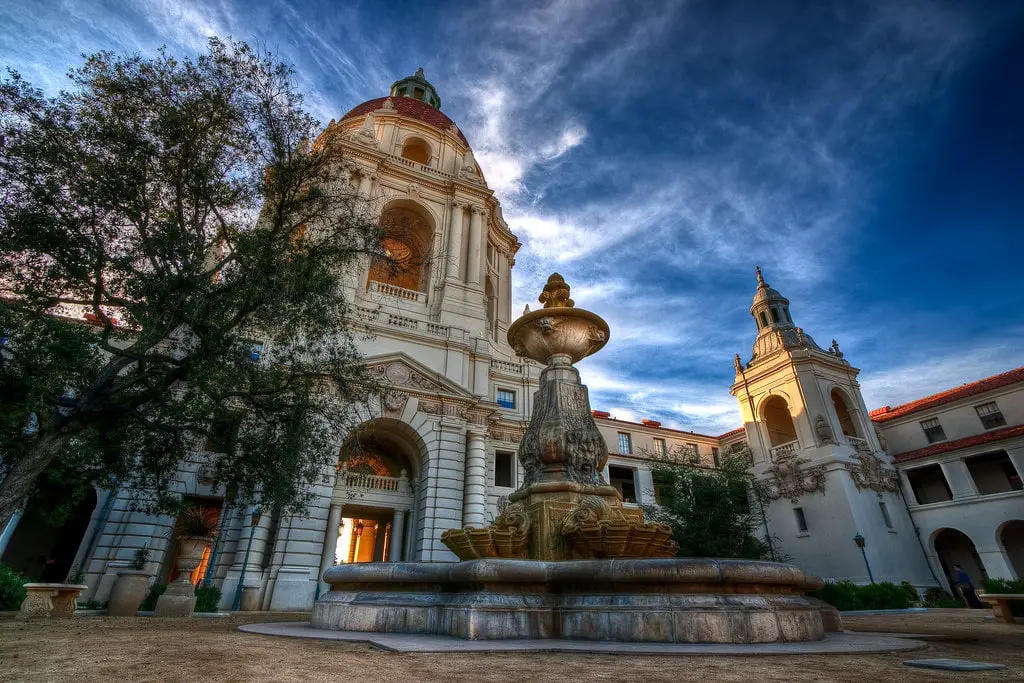The Beginning of an Architectural Icon
In the early 1920s, the residents of Pasadena saw the need for a civic center and approved a $3.5 million bond measure.
With the vision of creating a central element for the center, the renowned San Francisco architectural firm Bakewell and Brown was commissioned to design Pasadena City Hall.
The masterpiece, completed in 1927, showcased a beautiful blend of Mediterranean and Spanish Colonial Revival styles. The building spans over 170,000 square feet and houses more than 235 rooms and passageways.
Its iconic dome above the west entrance is 26 feet tall and 54 feet long. In 1980, the National Register of Historic Places recognized the importance of Pasadena City Hall and the Civic Center District.
Addressing the Challenges of Time
As the 20th century ended, Pasadena City Hall faced significant challenges. The building no longer adhered to modern building codes and was at risk of severe earthquake damage.
Cracks in the concrete walls, stairway tower damage, and stormwater damage further highlighted the need for restoration.
In 2004, the city embarked on a comprehensive renovation project led by the Architectural Resources Group from San Francisco.
Over three years, the building underwent a seismic retrofit, restoring offices and council chambers, updating the facade, and ensuring ADA compliance.
Additionally, the HVAC systems were upgraded, and the landscaping and lighting received improvements.
To better prepare for earthquakes, the building was lifted from its foundation, equipped with structural base isolators, and set on a new foundation. The renovation project was awarded LEED Gold certification.
By July 2007, Pasadena City Hall was fully operational, and the $117 million renovation exemplified the city’s dedication to preserving its architectural heritage.
| Year | Milestone |
|---|---|
| 1923 | Approval of bond measure for the civic center |
| 1927 | Completion of Pasadena City Hall |
| 1980 | Inclusion in the National Register of Historic Places |
| 2004 | Commencement of renovation and seismic retrofit |
| 2007 | Reopening of the fully restored City Hall |
City Hall’s Role in Film and Television
Pasadena City Hall in the Spotlight of Popular Culture
Pasadena City Hall is a beacon of governance and an architectural marvel in California. It is also a popular icon in popular culture, especially in film and television.
Its elegant facade and striking features have made it a go-to location for filmmakers looking to capture the essence of historical grandeur, fictional settings, and dramatic backdrops.

A Cinematic Journey Through Time
The journey of Pasadena City Hall through the cinematic world began with its courtyard serving as a picturesque Napa Valley town square in the 1995 film “A Walk in the Clouds.”
This romantic portrayal showcased the building’s versatility in adapting to various thematic settings, transcending its geographical identity to bring a vibrant community space filled with love and drama to life.
In 2005, Pasadena City Hall transitioned from a quaint town square to a pivotal location in “Rumor Has It,” directed by the esteemed Rob Reiner.
This feature film, starring Jennifer Aniston, Kevin Costner, and Shirley MacLaine, further cemented the City Hall’s place in modern cinema as a symbol of elegance and significance, bridging past narratives with contemporary stories.
A Versatile Character on Screen
Pasadena City Hall’s chameleon-like ability to transform into various on-screen personas is perhaps best exemplified in its role across different genres and eras.
It has served as a foreign embassy in the thrilling “Mission: Impossible” television series, showcasing its architectural versatility and international appeal.
Meanwhile, its transformation into a villa in Charlie Chaplin’s Oscar-nominated 1940 film “The Great Dictator” highlighted its timeless beauty and dramatic potential.
The building has also played a significant role in television, becoming the fictional city hall of Pawnee, Indiana, in the beloved series “Parks and Recreation.”
This role allowed viewers to connect with the building every week, embedding it in the fabric of American pop culture as a symbol of community and governance.
Iconic Appearances and Enduring Legacy
Pasadena City Hall’s dome has made notable appearances, including through the window of the main characters’ apartment in “The Big Bang Theory,” set against the backdrop of Pasadena.
This subtle inclusion speaks volumes of the building’s iconic status and recognizability, connecting the fictional world of the series with the tangible reality of Pasadena’s landscape.
The City Hall’s cinematic journey does not end here; it featured in the gripping finale of “Jericho,” serving as the City Hall of Cheyenne, Wyoming, and marked its presence in the adrenaline-fueled opening of “The Amazing Race 21” premiere.
Its versatility was further showcased in “The Confession” episode of “The Incredible Hulk” and in the opening sequences of the TV court show “The Judge” from 1986 to 1993, underlining its enduring appeal and versatility as a filming location.
Pasadena City Hall’s journey through the lens of popular culture underscores its significance beyond municipal functions—it has become a beloved character in its own right, etching its elegance and grandeur into the hearts of viewers worldwide.
Its legacy in film and television is a testament to this architectural masterpiece’s timeless beauty and cultural resonance.
Celebrating Pasadena City Hall’s Legacy
Pasadena City Hall is more than just a historic landmark; it’s a testament to its commitment to architectural preservation and cultural heritage.
From its inception as part of the City Beautiful movement in the 1920s to its extensive renovation and seismic retrofit in the 21st century, the building stands as an enduring symbol of Pasadena’s rich history.
Furthermore, its frequent appearances in film and television have earned it a unique place in pop culture, showcasing the charm and allure of this Southern California gem.
As we celebrate the legacy of Pasadena City Hall, we are reminded of the importance of preserving our architectural treasures for future generations to appreciate and enjoy.
